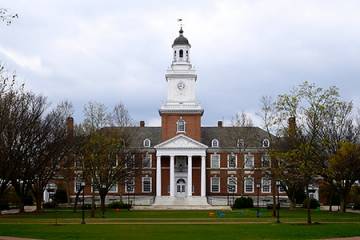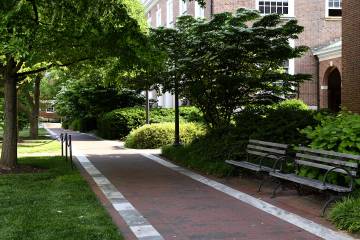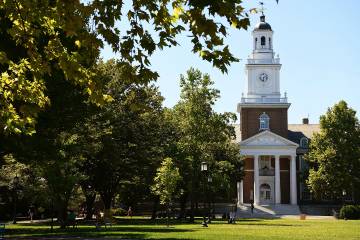Johns Hopkins University leadership continues to consider a range of instructional options for when academic activities resume in the months ahead amid the lingering uncertainty and public health risks of the COVID-19 pandemic, with planning proceeding based on the phased approach outlined in the university's recently published Return to Campus Guide.
The Academic Programs workgroup—led by Stephen Gange, executive vice provost for academic affairs—is preparing guidelines on a number of issues related to the resumption of instruction, including the need to plan for different phases of operation, instructor and student accommodations and adjustments, health and safety in the learning environment, and preparation for instruction with mixed and remote/online modality. The workgroup, which includes 80 administrators, faculty, and staff, shared draft guidance on Thursday.
Options for how courses could be conducted while prioritizing both the educational and health and safety interests of students include:
- Large courses could be split into several smaller sections so they could be held in-person while meeting physical distance requirements
- In-person lectures could be delivered by an instructor isolated in a dedicated studio or modified classroom, broadcasting live to students in a different classroom or off-campus
- Some courses could be delayed and offered in a future semester, when public health conditions have improved
- Courses could be shifted entirely to a remote/online model, as was the case for the conclusion of the spring 2020 semester
Disruptions due to COVID-19 are expected to continue, requiring extraordinary planning and flexibility as the university determines the best ways to continue instructional and other activities in all operational phases. In addition to planning for a return to campus, each school is also assessing how to make as many of its falls courses as possible virtually accessible to accommodate students and faculty who cannot be physically present for health and safety of other reasons, Gange said. These unconventional approaches will help students continue to progress academically during unprecedented times, he added.
"There is no question of whether or not we will be open for instruction: We will be ready to fulfill our core teaching mission," said Gange, a professor of epidemiology at the university's Bloomberg School of Public Health. "The academic community is working hard to achieve the high standards of excellence in instruction and student satisfaction that are hallmarks of a Johns Hopkins education."
Gange discussed the workgroup's deliberations during a virtual town hall event on Friday morning, the fourth such event as the university seeks to engage faculty, staff, and students in the 2020 Planning process. He was joined by Jon Links, professor, vice provost, and chief risk and compliance officer; Nancy Kass, professor and vice provost for graduate and professional education; and Andrew Douglas, professor and vice provost for faculty affairs.
Video credit: Johns Hopkins University
The discussion comes as colleges and universities across the country confront the challenges of safely conducting classes and other activities during the pandemic. Some schools have announced plans for modified fall semesters, others plan to remain entirely online in the fall, and many others are still deliberating.
Though Johns Hopkins has not yet taken the first steps in its phased plan to resume on-campus activities, it is expected, given current public health trends in the U.S. and the status of state and local regulations, that additional research activities could begin in the coming weeks. If the public health situation continues to improve over the summer, the university could increase on-campus activities in August, before the start of the fall semester. This phase would include resuming some in-person academic activity, though remote/online learning would be an option for most courses, to accommodate those who unable to return to campus and/or among populations vulnerable to negative COVID-19 outcomes. Additionally, the number of classroom seats available for in-person instruction would be significantly reduced as a result of social and physical distancing requirements.
The draft guidelines from the Academic Programs workgroup are meant to dovetail with other cross-divisional planning efforts to safely support the resumption of on-campus activities, as outlined in the draft Return to Campus Guide shared by the university last week. That document contains broad guidance on a host of topics related to personal safety practices, including altered staffing and scheduling for employees, universal face coverings, significantly augmented cleaning protocols on campuses, and protocols for riding a shuttle or using an elevator.
Given the nature of the pandemic, Gange said, part of the workgroup's advice is that schools and divisions prepare for the possibility that the university might return to a more restrictive public health posture at any time during the academic year, and on very short notice.
"Our highest priority is to put health and safety first," Gange said. "None of our recommendations are being made in a vacuum—we are adopting an evidence-based risk management approach to the COVID-19 challenge, and our decisions are being guided by state and local leaders and the most current guidance from OSHA and CDC, as well as the research by our own public health experts and input from the university community."
Posted in University News










